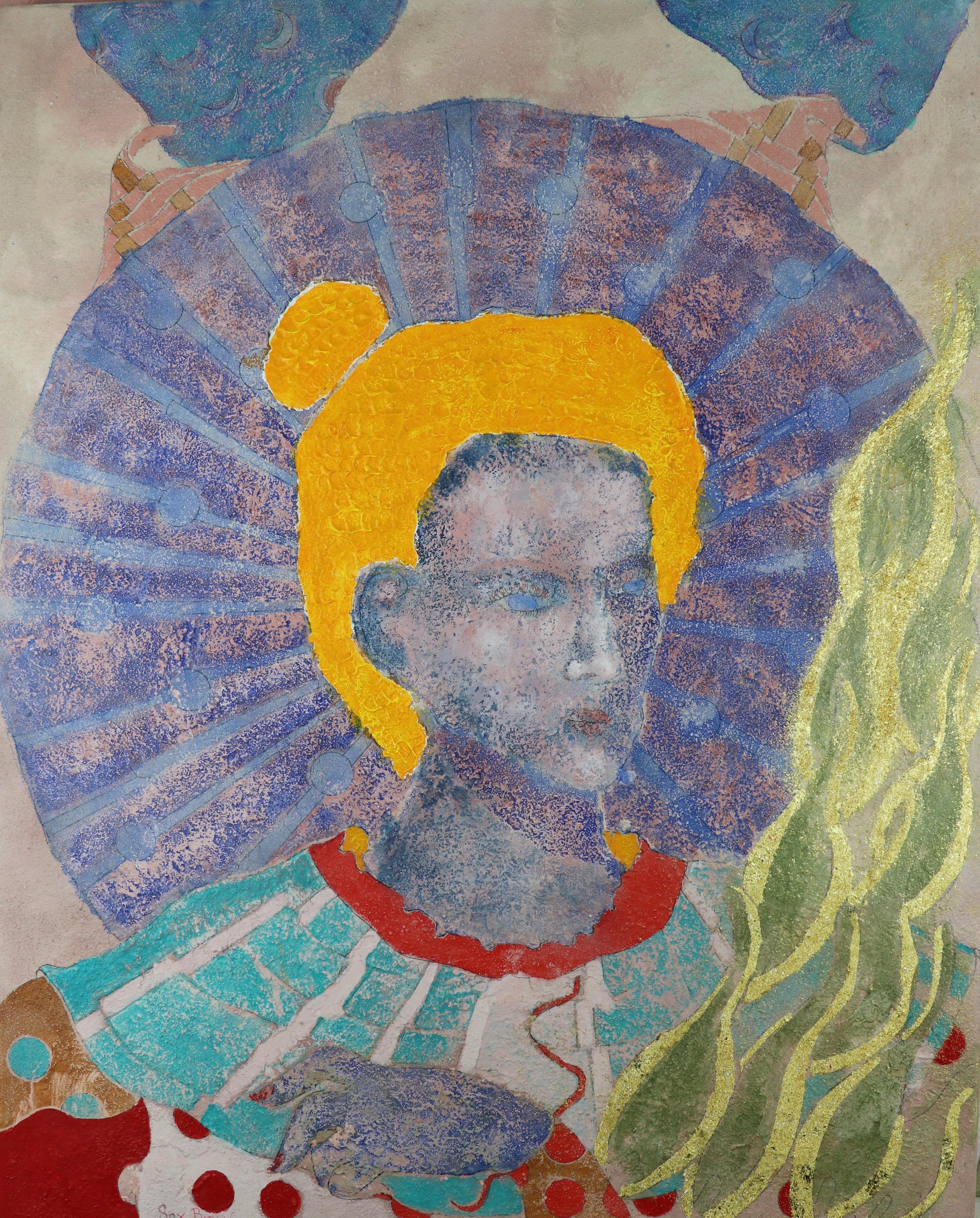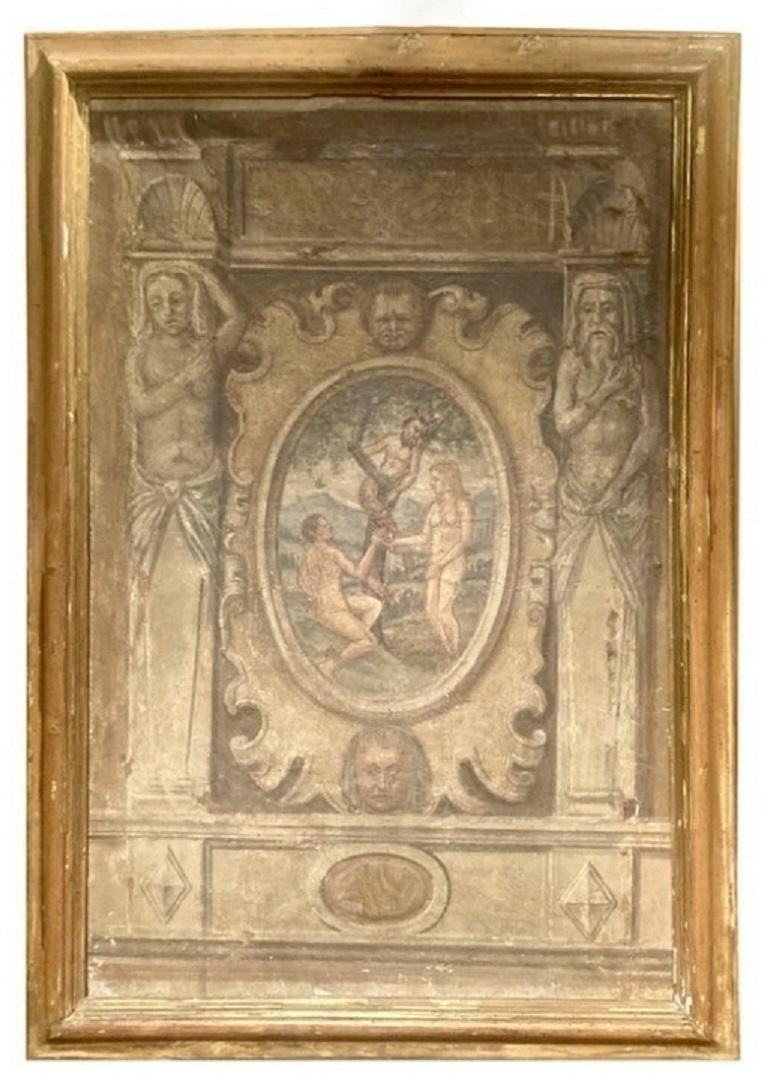Orovida PissarroDinka with a Bongo by Orovida Pissarro - Animal painting1937
1937
About the Item
- Creator:Orovida Pissarro (1893 - 1968)
- Creation Year:1937
- Dimensions:Height: 33.47 in (85 cm)Width: 24.53 in (62.3 cm)
- Medium:
- Movement & Style:
- Period:
- Condition:
- Gallery Location:London, GB
- Reference Number:1stDibs: LU261210740862
Orovida Pissarro
Orovida Pissarro, the only child of Lucien and Esther Pissarro, was the first woman in the Pissarro family to become a professional artist and the first Pissarro of her generation to take up painting. Born in Epping, England, in 1893, she lived and worked predominantly in London, where she was a prominent member of several British arts clubs and societies.
Orovida first learned to paint in the Impressionist style from her father and, after a brief period of formal study with Walter Sickert in 1913, she renounced formal art schooling.
Throughout her career, Orovida always remained outside mainstream British art movements. Much to Lucien's disappointment, she soon turned away from naturalistic painting and developed an unusual style that combined elements of Japanese, Chinese, Persian and Indian art. Her rejection of Impressionism, which, for the Pissarro family, was a way of life, and her simultaneous decision to drop her famous last name and use simply Orovida as a nom de peintre, reflected a desire for independence and distance from the family legacy, of which she nevertheless remained proud.
Orovida's most distinctive works are her paintings from the 1920s and 1930s in gouache (she called her mixture body color) and tempera, applied in thin, delicate washes to silk, linen, paper or gold leaf and embellished with brocade borders. These elegant and richly decorative works generally depict non-Western subjects, for example: Mongolian horseback riders, African dancers and Persian princes, often engaged in activities such as dancing or hunting rituals.
The second half of Orovida's painting career is marked by a dramatic change in both style and subject matter. In the mid-1940s, she began to embrace contemporary subjects from everyday life and returned to a more naturalistic style. Her new style was more suited to oils, and thus, she returned to that medium.
Over the course of her life, Orovida was aware of the mixed blessing of having famous artists in the family; not only a grandfather and father but also four uncles, and towards the end of her life, she was instrumental in developing the Pissarro family archive that her mother had established at the Ashmolean Museum in Oxford.
(Biography provided by Stern Pissarro Gallery)
- ShippingRetrieving quote...Ships From: London, United Kingdom
- Return PolicyA return for this item may be initiated within 7 days of delivery.
- Migration (The Horses) by Orovida Pissarro - Painting of running horsesBy Orovida PissarroLocated in London, GB*UK BUYERS WILL PAY AN ADDITIONAL 20% VAT ON TOP OF THE ABOVE PRICE Migration (The Horses) by Orovida Pissarro (1893-1968) Egg tempera on linen laid on board 76 x 101 cm (29 ⅞ x 39 ...Category
1930s Modern Animal Paintings
MaterialsLinen, Egg Tempera, Board
- Portrait of a Woman by Orovida Pissarro - Portrait paintingBy Orovida PissarroLocated in London, GBPortrait of a Woman by Orovida Pissarro (1893-1968) Egg tempera on silk laid down on stretched linen 47.6 x 37 cm (18 ³/₄ x 14 ⁵/₈ inches) Signed and dated upper right, OROVIDA 1936 Provenance: Christie's London, 1985 Kunstgalerij De Vuyst, Belgium Private collection, London Private collection, London, by descent Artist biography: Orovida Camille Pissarro...Category
1930s Portrait Drawings and Watercolors
MaterialsLinen, Egg Tempera
- Bonfire, Jubilee Night by Orovida Pissarro - Egg tempura painting, 1936By Orovida PissarroLocated in London, GBBonfire, Jubilee Night by Orovida Pissarro (1893 - 1968) Egg tempura on linen 86 x 111 cm (33 ⁷/₈ x 43 ³/₄ inches) Signed and dated lower left Executed in 1936 Provenance Private co...Category
1930s Modern Figurative Paintings
MaterialsLinen, Egg Tempera
- Siamese Cat with Kittens by Orovida Pissarro - Egg tempura paintingBy Orovida PissarroLocated in London, GBSiamese Cat with Kittens by Orovida Pissarro (1893-1968) Egg tempera on linen 39 x 48 cm (15³/₈ x 18⁷/₈ inches) Signed lower right Orovida and dated lower left 1934 Provenance J Ankri, 8th October 1967 Literature K L Erickson, Orovida Pissarro: Painter and Print-Maker with A Catalogue Raisonné of Paintings, (doctoral thesis), Oxford, 1992, Appendices, no. 51, p. 56 (illustrated) Exhibition London, The Leicester Galleries, Paintings by Orovida, February 1935, no. 6 Women’s International Art Club, 20th February - 13th March 1937, no. 273 London, Redfern Gallery, Ten Years of Work by Orovida, 5th-28th May 1938, no. 7 London, The Royal Society of British Artists, Summer Exhibition, 1947, no. 281 (possibly the etching) London, O’Hana Gallery, Paintings, Drawings and Coloured Etchings: Orovida, 3rd-18th October 1957, no. 13 Artist biography Orovida Camille Pissarro, Lucien and Esther Pissarro’s only child, was the first woman in the Pissarro family as well as the first of her generation to become an artist. Born in Epping, England in 1893, she lived and worked predominantly in London where she became a prominent member of several British arts clubs and societies. She first learned to paint in the Impressionist style of her father, but after a brief period of formal study with Walter Sickert in 1913 she renounced formal art schooling. Throughout her career, Orovida always remained outside of any mainstream British art movements. Much to Lucien's disappointment she soon turned away from naturalistic painting and developed her own unusual style combining elements of Japanese, Chinese, Persian and Indian art. Her rejection of Impressionism, which for the Pissarro family had become a way of life, together with the simultaneous decision to drop her famous last name and simply use Orovida as a ‘nom de peintre’, reflected a deep desire for independence and distance from the weight of the family legacy. Orovida's most distinctive and notable works were produced from the period of 1919 to 1939 using her own homemade egg tempera applied in thin, delicate washes to silk, linen or paper and sometimes embellished with brocade borders. These elegant and richly decorative works generally depict Eastern, Asian and African subjects, such as Mongolian horse...Category
1930s Modern Animal Paintings
MaterialsLinen, Egg Tempera
- Winter (The Skaters) by Orovida Camille Pissarro - Winter scene paintingBy Orovida PissarroLocated in London, GB*UK BUYERS WILL PAY AN ADDITIONAL 20% VAT ON TOP OF THE ABOVE PRICE Winter (The Skaters) by Orovida Camille Pissarro (1893-1968) Egg tempera ...Category
1930s Modern Figurative Paintings
MaterialsLinen, Egg Tempera
- The babies of Israel by Lélia Pissarro - Work on paper, FigurativeBy Lelia PissarroLocated in London, GBThe babies of Israel by Lélia Pissarro (b. 1963) Tempera on paper 8.7 x 6 cm (3 ³/₈ x 2 ³/₈ inches) Signed lower right, Lélia Pissarro Executed in 2023 This work is accompanied by a...Category
21st Century and Contemporary Impressionist Figurative Drawings and Wate...
MaterialsTempera, Paper
- Angel Of Peace: Contemporary Mixed Media Figurative PaintingBy Sax BerlinLocated in Brecon, PowysIn these testing times it's become easy to turn inwards rather than looking outwards into the world. In a painting that is archetypical of Sax Berlin Angel of Peace is a reflection ...Category
2010s Contemporary Figurative Paintings
MaterialsMarble, Gold Leaf
- Italian Renaissance Egg Tempera Fresco on Canvas, The Temptation of Adam and EveLocated in Firenze, ITThis art piece is a Florentine Renaissance period fresco of late 1500 hand painted with egg tempera representing the temptation of Adam and Eve, this pivotal moment in the history of genesis is framed in an oval scrolled cartouche and flanked by architectural pillars featured as two sculptural male and female caryatids holding the entablature of the palazzo. This antique Italian old master...Category
16th Century Renaissance Figurative Paintings
MaterialsCotton Canvas, Egg Tempera
- Abstraction About SubtleBy Krzysztof SokolovskiLocated in Delray Beach, FLAbstraction About Subtle Royal blue with gold leaf on carved wood panel. Krzysztof (Chris) Sokolovski born in 1985 in Eisiskes in Lithuania. Visual artist creating neosacral art: pa...Category
2010s Conceptual Abstract Sculptures
MaterialsGold Leaf
- Breath of the dragon, egg tempera & wax artwork by Sara FreemanLocated in BUNGENDORE, AUContemporary Australian painter Sara Freeman uses multiple layers of egg tempera over a base layer of beeswax to create meaningful, slow art. The linework through the image is made f...Category
21st Century and Contemporary Contemporary Abstract Paintings
MaterialsWax, Egg Tempera
- "Birth of Christ" after a Russian icon of the 15th century. Oliver SamsingerLocated in Segovia, ES"Birth of Christ", after a Russian icon of the 15th century. Tempera and gold leaves on gesso, wooden board. Dimensions: (H) 68 x (W) 52 x (D) 4 cm. This icon sums up the events of the birth of Christ. At the top left the three wise men from the Orient approach on horses. ABOUT THE ARTIST Oliver...Category
1990s Byzantine Mixed Media
MaterialsGold Leaf
- Christ Pantocrator after an Russian icon of the 15th CenturyLocated in Segovia, ESChrist Pantocrator after a Russian icon of the 15th Century. Tempera and gold leaf on gesso over a wooden board. Measurements in centimeters: 38 x 29.5 x 3 cm. / In inches: 14.96 x 11.8 x 1.18 " This is how the artist sums up the technique used by him to create the icon: “The aim of these steps is to create a durable painting. The icon is eternal. The first step is to choose a support, traditionally made of wood, from the center of the trunk to avoid warping it. For this purpose, two hardwood bolts were often used on the back to give the picture panel additional stability. Often a frame is milled out. Then the image carrier is sanded smooth and now 12 or 14 thin layers of gesso are applied and sanded smooth as well. Then the preliminary drawing is applied and the drawing board is prepared with a special preparation called bolus. This bolus can be polished to a high gloss. Afterwards, the gold leaf is "shot" with special brushes. It dries up within a few hours and can now be polished with agate. Gold leaf is real 24-carat gold. Now does the actual process of painting begins. Egg tempera is made fresh from egg yolk, water, and a little vinegar. This is used to prepare the color pigments. Tempera painting is done in numerous layers from dark to light. When the icon is finished, it is left to dry for a few months and varnished with a special varnish called Olifa made from boiled linseed oil and other ingredients”. ABOUT THE ARTIST Oliver Samsinger (Vienna, 1968) began to take an interest in icons in 1990. He undertakes several trips to Bulgaria, Greece, and Cyprus to see in situ the original works treasured in these three countries. This experience will be crucial in his life since the studies carried out in Sofia, the Bulgarian capital, and his stay on Mount Athos...Category
1990s Byzantine Mixed Media
MaterialsGold Leaf


